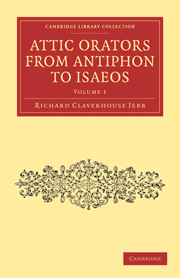Book contents
- Frontmatter
- PREFACE
- EDITIONS AND AUTHORITIES
- Contents
- CORRIGENDA
- ANNALS
- INTRODUCTION
- CHAPTER I ANTIPHON.—LIFE
- CHAPTER II ANTIPHON.—STYLE
- CHAPTER III ANTIPHON.—WORKS
- CHAPTER IV ANDOKIDES.—LIFE
- CHAPTER V ANDOKIDES.—STYLE
- CHAPTER VI ANDOKIDES.—WORKS
- CHAPTER VII LYSIAS.—LIFE
- CHAPTER VIII LYSIAS.—STYLE
- CHAPTER IX LYSIAS.—WORKS
- CHAPTER X LYSIAS.—WORKS
- CHAPTER XI LYSIAS.—WORKS
INTRODUCTION
Published online by Cambridge University Press: 05 October 2010
- Frontmatter
- PREFACE
- EDITIONS AND AUTHORITIES
- Contents
- CORRIGENDA
- ANNALS
- INTRODUCTION
- CHAPTER I ANTIPHON.—LIFE
- CHAPTER II ANTIPHON.—STYLE
- CHAPTER III ANTIPHON.—WORKS
- CHAPTER IV ANDOKIDES.—LIFE
- CHAPTER V ANDOKIDES.—STYLE
- CHAPTER VI ANDOKIDES.—WORKS
- CHAPTER VII LYSIAS.—LIFE
- CHAPTER VIII LYSIAS.—STYLE
- CHAPTER IX LYSIAS.—WORKS
- CHAPTER X LYSIAS.—WORKS
- CHAPTER XI LYSIAS.—WORKS
Summary
The Augustan Atticism
In the reign of Augustus, when Rome had become the intellectual no less than the political centre of earth, a controversy was drawing to a close for which the legionaries cared less than their master, but which for at least fifty years had been of some practical interest for the Forum and the Senate, and which for nearly three centuries had divided the schools of Athens, of Pergamos, of Antioch, of Alexandria, of all places where men spoke and wrote a language which, though changed from the glory of its prime, was still the idiom of philosophy and of art. This controversy involved principles by which every artistic creation must be judged; but, as it then came forward, it referred to the standard of merit in prose literature, and, first of all, in oratory. Are the true models those Attic writers of the fifth and fourth centuries, from Thucydides to Demosthenes, whose most general characteristics are, the subordination of the form to the thought, and the avoidance of such faults as come from a misuse of ornament? Or have these been surpassed in brilliancy, in freshness of fancy, in effective force by those writers, belonging sometimes to the schools or cities of Asia Minor, sometimes to Athens itself or to Sicily, but collectively called ‘Asiatics,’ who flourished between Demosthenes and Cicero? This was the question of Atticism against Asianism.
- Type
- Chapter
- Information
- Attic Orators from Antiphon to Isaeos , pp. lxiii - cxxxviiiPublisher: Cambridge University PressPrint publication year: 2010



